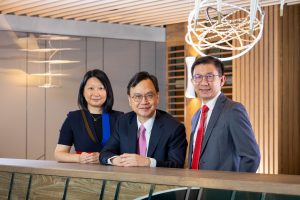CUHK
News Centre
Three CU Medicine scholars named in world’s “Top 20 Translational Researchers”
Professor Dennis LO receives the honour for the fifth consecutive year
Professor Dennis Yuk Ming LO, Professor Rossa Wai Kwun CHIU and Professor Allen Kwan Chee CHAN from the Faculty of Medicine at The Chinese University of Hong Kong (CU Medicine) have been named among the “Top 20 Translational Researchers of 2020” by the world-renowned scientific journal Nature Biotechnology. The trio are the only scholars from Hong Kong on the list, and it is also the fifth consecutive year for Professor LO to receive this honour.
Nature Biotechnology ranked the top translational researchers in biotech based on the number of patents (European and U.S.) granted in 2020, the researcher’s top-cited patents over the past five years (2016-2020), and the citation scores of their publications (H-index). These are the indicators of how their biomedical research results have been effectively translated into clinical applications, being appreciated as translational research. The top-cited patent of the three professors during the period was “Non-invasive determination of methylome of fetus or tumour from plasma”.
Discovering prenatal and cancer diagnostic markers based on DNA methylation
Known as “the Father of Non-invasive Prenatal Testing”, Professor Dennis LO is the Director of the Li Ka Shing Institute of Health Sciences, Associate Dean (Research) and Chairman of the Department of Chemical Pathology of CU Medicine. Professor LO joined CUHK in 1997 and reported the presence of cell-free fetal DNA in maternal plasma in the same year. He and his colleagues have been instrumental in making non-invasive DNA based prenatal testing a clinical reality. The non-invasive prenatal test (NIPT) for Down syndrome developed by the team has been widely regarded as a significant breakthrough in the global scientific community. The test has been widely adopted in dozens of countries and used by millions of pregnant women every year. This scientific achievement lays the foundation for developing non-invasive tests for cancer detection based on similar scientific principles.
Professor Rossa CHIU, Associate Dean (Development), and Professor Allen CHAN, Assistant Dean (External Affairs) of CU Medicine and also of the Department of Chemical Pathology, have been working closely with Professor LO in the development of non-invasive plasma DNA tests for Down syndrome screening, as well as new prenatal and cancer diagnostic approaches based on circulating nucleic acids. Nature Biotechnology highlighted their work on the development of a new class of prenatal and cancer diagnostic markers that are based on DNA methylation.
DNA methylation refers to a type of biochemical change of DNA that allows one to trace the tissue of origin of a DNA molecule. In prenatal diagnostic testing, such tracing would help identify if a DNA molecule is coming from the fetus or the mother. In cancer, DNA methylation is altered or disrupted and therefore methylation patterns provide hints to the presence of a tumour. Based on the analysis of the epigenetic mechanism, the team has opened up many new applications of circulating nucleic acids, from elucidating the origin of an aberrant signal in NIPT to detecting myocardial damage and liver damage, investigating the causes of anemia and tracing the tissue of origin of cancer.
Prime time for biotechnology research and development in Hong Kong
Professor Dennis LO felt most honoured to be named for the fifth time. He said, “Being named a top translational researcher five years in a row by Nature Biotechnology is a tremendous recognition and encouragement to me and my team. It is most exciting to receive the honour with Rossa and Allen. Circulating nucleic acids have provided a treasure trove of molecular diagnostics and research. I have been fortunate to be involved in this exciting field for the past two decades with a great team. We are entering a prime time for biotechnology research and development in Hong Kong. We are seeing more opportunities for the young as the city is fueling for the development of a health technology hub in the Greater Bay Area.”
Professor Rossa CHIU said, “I am very grateful to be on the list again after being named in the 2018 list. It is most rewarding to see our work in non-invasive screening having a global impact in prenatal care and heading in a similar direction in oncology. Our latest work has mapped out multiple types of aberrations in a cancer genome non-invasively. Our ultimate goal is to enable early cancer detection and treatment.”
Professor Allen CHAN said, “Nature Biotechnology is a prestigious international journal and I am very grateful to be selected as one of the top translational researchers. We have developed genetic-epigenetic tissue mapping to determine the tissue composition of plasma DNA carrying genetic variants not presented in the constitutional genome through comparing their methylation profiles with relevant tissues. Diagnostically, we have validated the approach in prenatal testing and organ transplantation monitoring.”
About Nature Biotechnology and its annual ranking of top 20 translational researchers
Nature Biotechnology is a scientific journal published by Nature, one of the world’s most authoritative and prestigious academic and scientific journals. Coverage of Nature Biotechnology includes gene therapy, regenerative medicine and biomedical engineering.
Topping the list this year is Chinese-American biochemist Professor Feng ZHANG at Massachusetts Institute of Technology (MIT) who is one of the pioneers behind CRISPR technologies. Professor LO and Professor Rossa CHIU are ranked seventh on the list and Professor Allen CHAN is in fourteenth place. Another inventor on the list who is also from an Asian institution is Professor Ningshao XIA of Xiamen University. His top-cited patent is on “Polypeptides and antibodies for treating HBV infection and related diseases”. Other named scholars include translational researchers from renowned institutions in the U.S. and Germany, such as MIT, Harvard University and Stanford University.

(From left) Professor Rossa Wai Kwun CHIU, Professor Dennis Yuk Ming LO and Professor Allen Kwan Chee CHAN from CU Medicine have been named the “Top 20 Translational Researchers of 2020” by Nature Biotechnology. The world-renowned scientific journal highlighted their work on the development of a new class of prenatal and cancer diagnostic markers that are based on DNA methylation.




